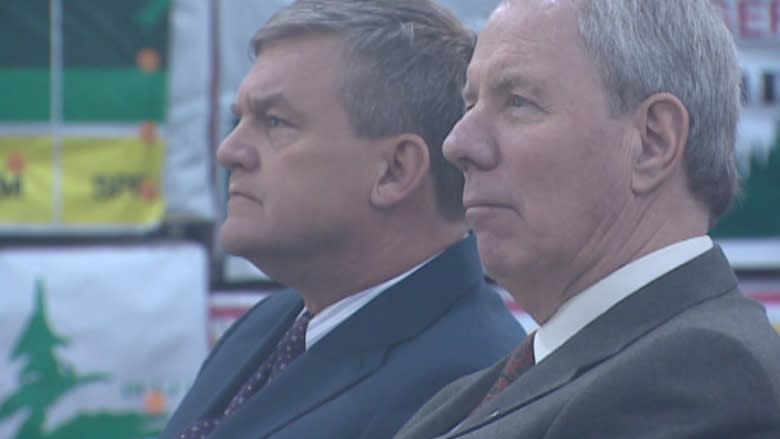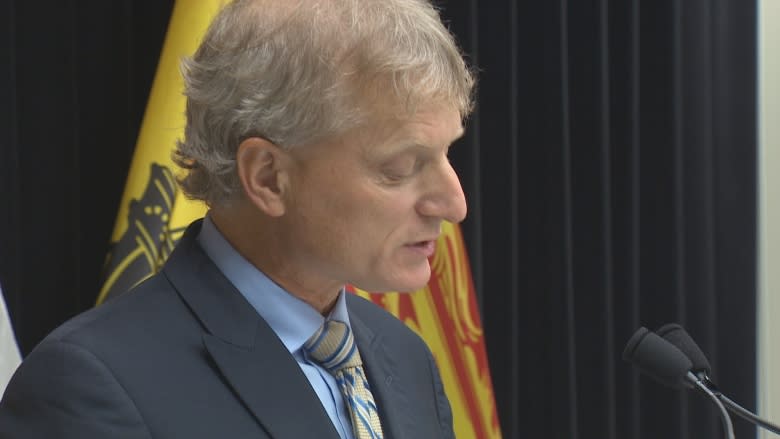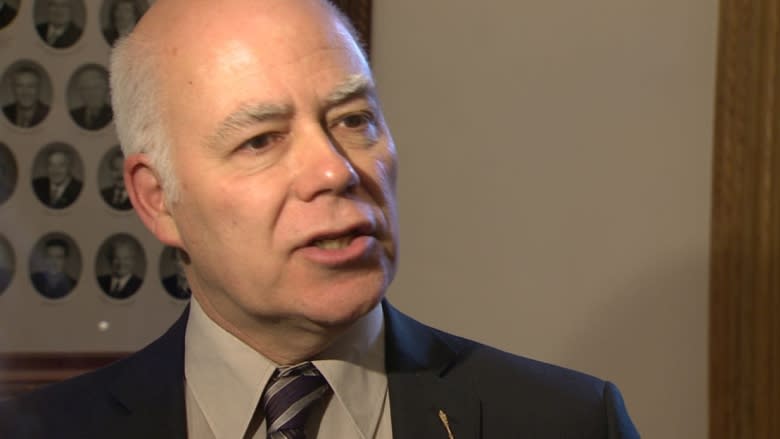Forestry changes in 2014 made New Brunswick lumber a target in U.S.
The U.S. forest industry's attack on New Brunswick sawmills was based in part on the forestry plan launched in 2014 by the previous Progressive Conservative government, according to documents filed in Washington.
While Gallant government officials insist nothing has changed in how New Brunswick sawmills buy their wood, a coalition of U.S. companies has argued that the Alward government's increase to Crown wood allocations crossed the line.
The increase in Crown wood and the decrease in private wood helped put the province in U.S. crosshairs, with lumber producers in that country arguing that growing sales from Crown land amounted to an unfair "benefit" or subsidy.
PC Leader Blaine Higgs, a member of the cabinet that approved the 2014 forestry plan, wouldn't say this week if he regrets the forestry plan, which boosted harvesting on Crown land by 21 per cent.
"The less we talk about this politically and such, the better," he said. "I don't want to make a political issue out of it."
19.88% tariff for most mills
It's not clear if the U.S. Commerce Department agreed with the industry arguments, but this week its preliminary ruling put a 19.88 tariff to all New Brunswick sawmills selling wood into the U.S.
The only exception was J.D. Irving Ltd., which faces a three per cent tariff.
Trade Minister Roger Melanson said Irving's lower tariff shows that the PC plan "didn't help to position New Brunswick companies that export softwood lumber to the U.S."
Under previous softwood lumber agreements, New Brunswick and the other Atlantic provinces were exempt from tariffs because they weren't seen as subsidizing their mills in the same way as other provinces.
The filing last Nov. 25 by an industry group called the Committee Overseeing Action for Lumber International Trade Investigations or Negotiations argues that has changed, and that the Alward plan is changing it even more.
It says Crown stumpage in New Brunswick was 41 per cent of all logs in 2004, not enough to warrant tariffs, but that rose to 51 per cent by 2013.
And the 2014 forestry plan "can be expected to result in an even higher share of New Brunswick timber coming from Crown land in future years," it continued.
Private logs dwindle to 12%
The document says logs from private woodlots now account "for as little as 12 per cent of the total softwood supply" in New Brunswick.
That share was "well within the range deemed problematic" that triggered tariffs on other provinces in previous softwood disputes, the filing says.
Compounding the problem is that the dominance of J.D. Irving Ltd. as the largest buyer of wood and the Crown lands as the largest seller of wood makes it hard to accurately measure a fair market price for wood, the U.S. industry argues.
The petition singled out New Brunswick for tariffs among the Atlantic provinces. It did not ask for tariffs on wood from Nova Scotia, Prince Edward Island or Newfoundland and Labrador.
Irving blamed by Coon
Green Party Leader David Coon is blaming that on J.D. Irving Ltd., accusing the company of abandoning other Maritime sawmills and "going it alone" in the softwood case.
Irving sought a voluntary investigation of its own sawmill businesses by the U.S., Coon said, a move that ended the united front once advanced by the Maritime Lumber Bureau.
The bureau represented all sawmills in the region for decades and since 1983 repeatedly managed to persuade Washington to not impose tariffs on mills here.
Coon said in the legislature that New Brunswick's high dependence on wood from Crown lands had been obscured by region-wide numbers.
But when Irving "broke with the Maritime Lumber Bureau," it exposed New Brunswick's numbers to greater scrutiny by the U.S., Coon said.
Melanson didn't respond directly to Coon's allegations.
"We've got to be really careful," he said, warning that saying the wrong thing may make it harder for New Brunswick to get the U.S. decision reversed.
Irving said earlier this week it doesn't want to see other mills hit with a higher tariff because those mills often supply Irving mills with chips, bark and other residue products.
The company did not respond to a request for comment on Coon's accusations Thursday.
Irving gained expertise
Donny Crabbe of H.J. Crabbe and Sons Ltd. in Bristol said Irving likely used a lot of the expertise it gained in a recent trade fight over paper exports to the U.S. to make its case on softwood.
"The Irvings had the opportunity to learn things the rest of us didn't have the chance to learn," he said.
Crabbe said he hopes Ottawa and the province will use the lower Irving tariff to convince Washington that other sawmills aren't unfairly subsidized either.
"It should bode well to prove that we are fair traders," he said.
Some of the filings in Washington show Irving was working with several companies, including Crabbe's, as part of a group called the New Brunswick Lumber Producers.
The group had a Washington law firm representing its interests. Irving also had its own law firm representing its interests alone.
A final ruling by the Trump administration on the tariffs is due later this year. In the meantime, the federal government says it will try to negotiate a new softwood deal.




